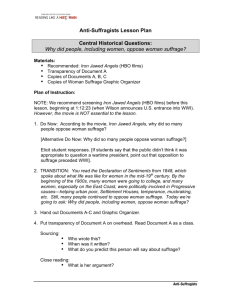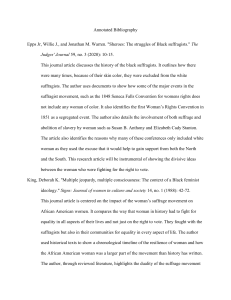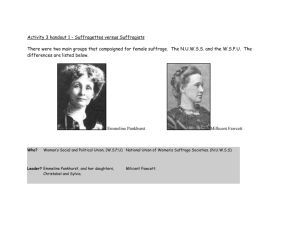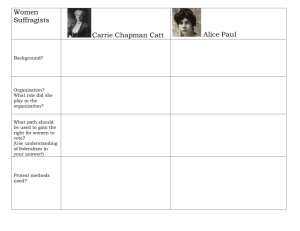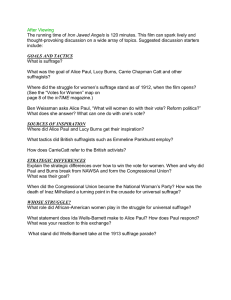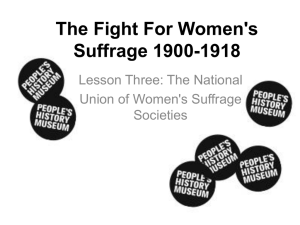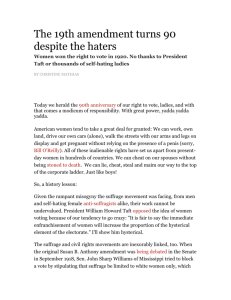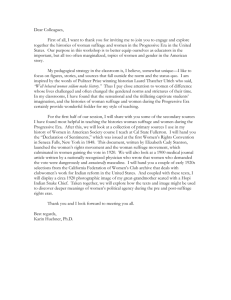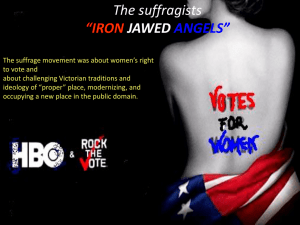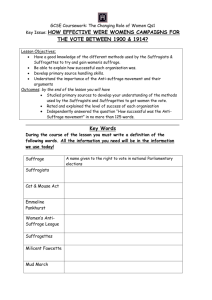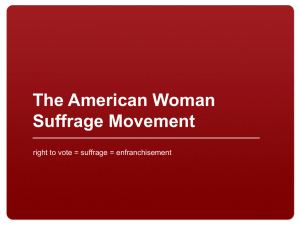Document A: Molly Elliot Seawell (ORIGINAL)
advertisement
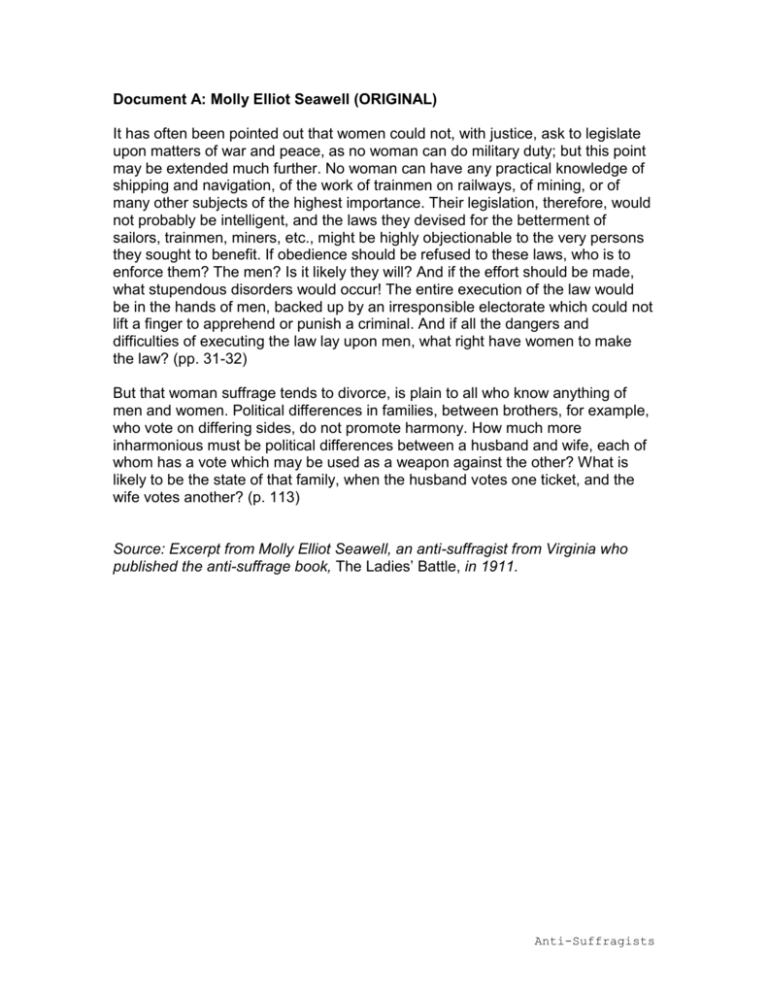
Document A: Molly Elliot Seawell (ORIGINAL) It has often been pointed out that women could not, with justice, ask to legislate upon matters of war and peace, as no woman can do military duty; but this point may be extended much further. No woman can have any practical knowledge of shipping and navigation, of the work of trainmen on railways, of mining, or of many other subjects of the highest importance. Their legislation, therefore, would not probably be intelligent, and the laws they devised for the betterment of sailors, trainmen, miners, etc., might be highly objectionable to the very persons they sought to benefit. If obedience should be refused to these laws, who is to enforce them? The men? Is it likely they will? And if the effort should be made, what stupendous disorders would occur! The entire execution of the law would be in the hands of men, backed up by an irresponsible electorate which could not lift a finger to apprehend or punish a criminal. And if all the dangers and difficulties of executing the law lay upon men, what right have women to make the law? (pp. 31-32) But that woman suffrage tends to divorce, is plain to all who know anything of men and women. Political differences in families, between brothers, for example, who vote on differing sides, do not promote harmony. How much more inharmonious must be political differences between a husband and wife, each of whom has a vote which may be used as a weapon against the other? What is likely to be the state of that family, when the husband votes one ticket, and the wife votes another? (p. 113) Source: Excerpt from Molly Elliot Seawell, an anti-suffragist from Virginia who published the anti-suffrage book, The Ladies’ Battle, in 1911. Anti-Suffragists Document B: Anti-Suffrage Newspaper in New York (ORIGINAL) It is the Suffragists whose ideal is the kitchenless house fed from a mechanical institutional centre. The main proportion of Suffragist writing and speaking is on this pots and pans pattern, simply a denunciation of housekeeping as degrading. It is the Suffragist theory that the woman's sphere in life should be the same as the man's that has condemned her to share with him what is so hideous a misfit in the miscalled education of our industrial classes, whose girls are all taught as if destined for literary rather than manual occupations, as if the National funds were collected to compel the training of a surplus of cheap short-hand typists for the office, and to compel a lack of expert housewives in the home. It is the Suffragists who are destroying the wholesome personal element in female life, by their doctrine of degradation in the washing of pots and pans for husband, father and son, while they demand the vote, and opportunity to serve the State, the husbands, fathers, and sons of other people, with what? What service? An abstract service of legislation and administration, they reply: in fact all that barren "social service" which can be performed without the sweating of the brow, the soiling of a finger! Is it not clear how this hideous feminism is sapping our vitality as a nation? Is it too much to say that it is at the root of half the unhealth and disease of which to-day's unrest is symptomatic? There are many wealthy women who have espoused Suffragisim, and who, to promote it, do daily a very dangerous thing in preaching to working women that housework is degrading. And dangerous as is that direct denunciation of housework universal among Suffragists, of which the Woman's Labor League president's pots and pans speech is typical, there is another way inculcating contempt for it, which is even more dangerous because more insidious and less direct. An example of the insidious way in which the mischief is spread is shown in a letter to the Times of December 21 last, advocating the suffrage for women. It was written by a lady from the standpoint of the leisured and cultured classes, as she expressly said. "We more fortunate women," she wrote, plead for the franchise, not for our own sake, but for the sake of the working women (whose "round of toil" she stigmatized as "drudgery"), because "it shall bring them at once something at least of the respect and consideration which form the basis upon which we more fortunate women build our lives." Source: Article from an anti-suffrage newspaper, The Woman’s Protest Against Woman’s Suffrage, published in New York by the National Association Opposed to Woman Suffrage, in October 1912. Anti-Suffragists Document C: Tennessee Representative John A. Moon (ORIGINAL) It has been insisted that the real-purpose of this amendment is the basis for political legislation that will ultimately deprive the Southern States of representation in part in Congress and their force in national affairs .... In those Southern States where the colored population outnumbers the white to double the number of ignorant voters by giving the colored woman the right to vote would produce a condition that would be absolutely intolerable. We owe something to the wishes and the sentiments of the people of our sister States struggling to maintain law and order and white supremacy.... We are engaged now in a great foreign war. It is not the proper time to change the whole electoral system... Patriotism, in my judgment, forbids the injection of this issue into national politics at this time. Source: Representative John A. Moon of Tennessee, speech in House of Representatives, January 10, 1918, on the issue of the woman suffrage amendment. Anti-Suffragists
